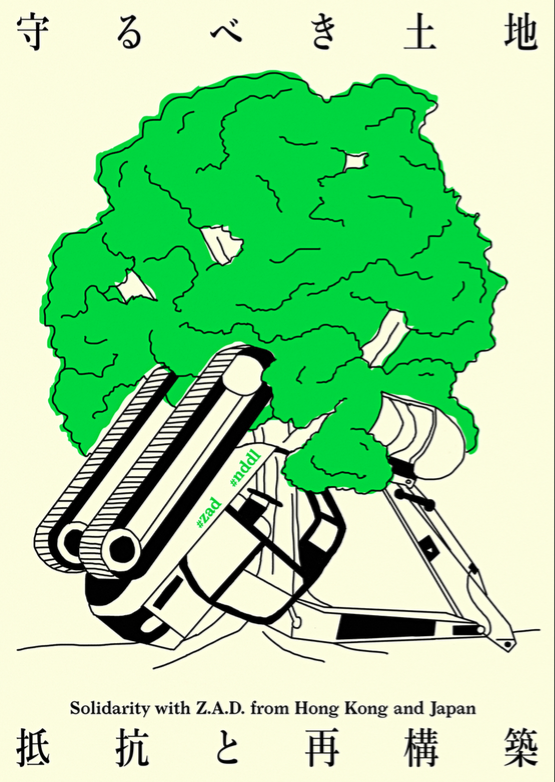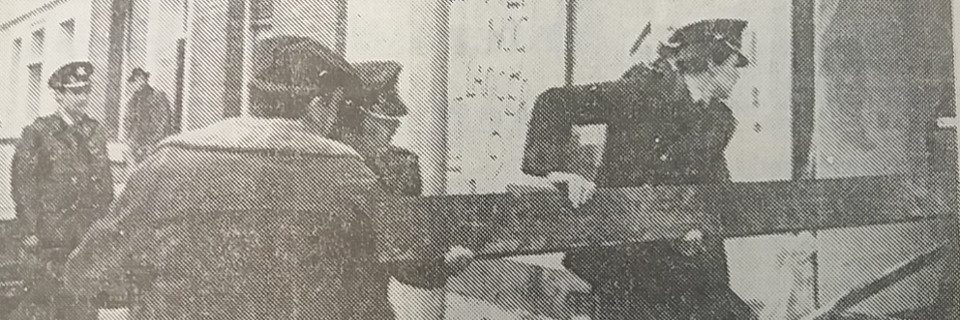Summer visit to ZAD NDDL

[…] what matters has everything to do with a logic of difference and possibility, autonomy and self-determination: the perpetuation of the possibilities of common life that place-based social relations can create, even amidst a striking diversity of beliefs. Where once the territory’s fight was with the airport or the train-line, it is no longer with high-speed transport per se, but with its world.
– Kristin Ross, The ZAD and NoTav (Verso)
Today I said “À Bientôt” to the ZAD (Zone to Defend) Notre-Dame-des-Landes and took the train to Paris. On arrival, as predicted, France won the World Cup. I decided to take the overnight coach to London, as opposed to flying from Nantes or from Paris.
Last night at the ZAD canteen, C. informed me that after the cancellation of the new airport project, the government are now planning an expansion for the existing Nantes airport. Investing in such infrastructure projects provides jobs and economic growth but only extends the expiry date of late capitalism (individualism, exploitation, pollution, etc.), and further contribute to climate change and ecological destruction. We see such infrastructure projects with the high-speed rail in Hong Kong and the new metro line eroding the forest in Mumbai, the Turin-Lyon high-speed rail project and the One Belt One Road striating China and beyond. There are many more around the world. Please share any that you may know.
As I wait for my coach in an Indian restaurant near Bercy station, my soul is still at the ZAD surrounded by the bocage, and with all the people and collectives that I met these past eight days.
Before arriving at the ZAD two French friends in Hong Kong expressed their disagreement with those people who are still on the territory after the cancellation of the airport. Those people are farmers and anarchists (across a wide spectrum from anarcho-primitivists to anarcho-communists), collectively known as Zadistes. On my way to the ZAD via Paris, I met a lawyer who studied in Nantes. He blamed the Zadistes for the broken windows at his local bank and also thinks that they should leave the territory. Our conversation met an unexpected halt when I asked him if he believes in ownership and privatisation, and spoke of those who own five or ten houses and those who have nothing, and how the world’s abundant resources could actually be shared–as a progressive commons or as the current inequitable system (individualist and survival of the fittest).
Following the cancellation of the airport, a new experiment is happening at the ZAD. Some call it ‘ZAD Par2’ (a wordplay on ‘partout’ meaning ‘everywhere’ in French and the sequel to the post-airport cancellation) and some call it a new commune for the 21st century. Whether you agree with the two French people in Hong Kong, are unsure like the Parisian lawyer or have a different perspective, why not visit the ZAD and see what has been built by different collectives over the past 10 years?
I arrived at the ZAD last Saturday afternoon to see a 50+ group of people of different ages in a hangar attending a sharing by Belgian philosopher Isabelle Stengers and Serge Gutwirth, an anarchist lawyer. I sat there desperately trying to understand what they were saying with my five years of GCSE French and taking notes of people and quotes that they mentioned in English. After a collective dinner outside in the evening sun, I went to sleep in the rural brick farmhouse under all the stars.
For the following three days I spent most of the daytime working with others at the Abazada (a ZAD embassy wordplay), which is a huge wooden farmhouse built specifically for global assemblies such as the upcoming Intergalactic Week this 27th August to 2nd September, that will include sharings, workshops and debates by those active in territorial struggles around the world.
At the Ambazada, with Zadistes, relatives of Zadistes and those visiting for ZADenVIES (a nine-day festival organised by the ZAD), we collectively built the 10 x 5-metre concrete platform at the front of the Ambazada. At times, three generations worked together, collecting brick-sized rocks from the road, shovelling gravel, mixing cement, precariously pushing wheelbarrows along narrow wooden planks and carefully pouring the concrete into a reinforced-steel cavity. At lunch we went to a nearby collective and ate organic vegetables grown on the ZAD. At night we ate together, talking until midnight.
Back in Hong Kong I rarely do such physically demanding work. F. joked that the police might think that the ZAD has a Chinese slave collecting rocks on the roadside [I learnt from C. that the police have the assumption that many Zadistes are from outside France]. The thought had already crossed my mind and we laughed together. I prefer to think of the hard work and the muscle ache as a gesture to be performed over and over again, in solidarity, and ‘Working for the Commons’ (a title inspired by Casco in Utrecht).
Back in Hong Kong I’ve been focusing on our ecological commons, farming in public space and sharing the plants, produce, pollinators (bees) and knowledge in non-commercial ways. Through our community garden at Kai Fong Pai Dong, we have grown plants with neighbourhood children, triad gang members, grandmas on their way to church and shops that have been generous with filling our large water bottles on a daily basis. The Ma Shi Po two and a half-month occupation in 2016 made me aware of ZAD struggle (thanks S.) and two years later I had an opportunity to finally visit.
At the ZAD, the commons exist in everyone’s shared and collective way of life. It is visible where collectives: live (in squatted farmhouses and farmlands); farm (the numerous collective gardens whose produce is shared with outside struggles, in the canteen everyday and at the Non-Market [free pricing] on Fridays); broadcast (on a pirate radio station that uses the same FM frequency as the former construction company that was going to work on the airport); produce knowledge (at the library and through the collective work and sharing of skills such as foraging and cheese making; dress (the abundance of clothes in the Free Shop); and are connected (pirated water and electricity supplies). It’s difficult to imagine a place more liberated than the ZAD (maybe Chiapas or Rojava, which I have both yet to visit). Walking down the road, Zadistes will stop their cars and ask if you’d like a lift somewhere. Like nature, biodiversity is able to thrive and evolve naturally in the commons. What if we were more emancipated and shared such collective resources in our daily urban life? We can be if we want to.
After the construction work was completed at the Ambazada, the following day I worked on the collective garden with Zadistes and those who came for ZADenVIES. As we weeded the carrots and applied mulch to the courgettes, a radical pedagogy emerged, where the three of us discussed the recent evictions and shared ideas on how to confront the militarised police in non-violent and creative ways. The conversations continued from plot to plot, and even a few days after, when others shared police confrontation stories from Paris, Glasgow and Istanbul.
After lunch, which was made and eaten at a nearby collective concealed in the forest, I weeded more carrots with a Zadiste and A., a 13-year old boy who had an English oral phone exam later that afternoon. The three of us prepared for the phone exam and in the process of practicing English, I began remembering more French. We discussed etymology and shared contemporary slang, in English and French. I left their company to work on another farm task knowing that A. was well-prepared for his exam.
When planting organic beetroot seeds I met two people who came alone to understand what is happening at the ZAD and wanted to offer their support. After hand watering the one-acre farm area, we rested and ate three varieties of tomatoes. We then had dinner at the Afghan tent at ZADenVies and later walked to the La Grée collective to climb a multi-storey wooden tower, watch a couple of games of international chess which were accompanied by freestyles by a member of the ZAD Social Rap group and enjoyed a solo performance in the nearby hangar.
During my eight days in the ZAD I was kindly given two tours by J. where we walked, cycled and visited many different collectives, cabins and farms on the ZAD, often stopping for him to share a personal history at specific sites (such as destroyed cabins by the police and collective rituals) and elaborate on what the future of the ZAD might be. I shared social movements happening in Hong Kong and in East Asia, and together we discussed creative forms of resistance and how anarchism can evolve in relation to the present situation.
[It is worth mentioning that several Zadistes told me that they were very impressed by the creativity of Hong Kong’s Umbrella Movement in 2014, and were vocal in encouraging me to share this with people in Hong Kong. One Zadiste even said that the Umbrella Movement was a strong point of reference for her and her partner during the Paris Climate Games in 2015]
A day before leaving the ZAD I joined T. on a forager’s tour and learnt that there were over 15 edible wild plants in the territory. She led us past some artistic barricades and visited a collective reorganising after the destruction of their beautiful cabin by the police last April. With almost no fixed shelter, I was impressed by their new constellation of spaces, pirated connectivity and to know that they would host a free techno party later that night, equipped with a 12 kilowatt sound system!
During the week at the farmhouse, I was reading Starhawk’s The Empowerment Manual: A Guide for Collaborative Groups and thought about the importance of care within collectives. After being a chef for the concrete mixture, I suggested that I cook a Chinese meal for the collective on Friday night with ZAD vegetables filling handmade Chinese dumplings. Dinner took longer than expected to cook (haha), but was timely in that a friend returned to the ZAD, with an increased determination in finishing her documentary.
After some memorable encounters, distributing all of our posters and even playing a game of Situationniste football with “Guy TroisBord,” I left the ZAD this afternoon with new friends. Our journey to Nantes train station was a quiet and reflective one, interrupted by boisterous and patriotic French football fans blowing and pressing horns on the street. Crossing the English Channel, I wonder if all this energy and love for a country could be redirected somehow, away from the spectacle, and towards a more equitable and sustainable future for France, and everything living thing on this planet.
I look forward to sharing my experiences with the two French people in Hong Kong and different farming communities in Hong Kong, especially Wang Chau Village, who expect an unjust eviction and the destruction of a valuable greenbelt later this year.
Today in all corners of the world, we continue, with determination, collectively working for the commons.
Michael Leung
15th July 2018, France
